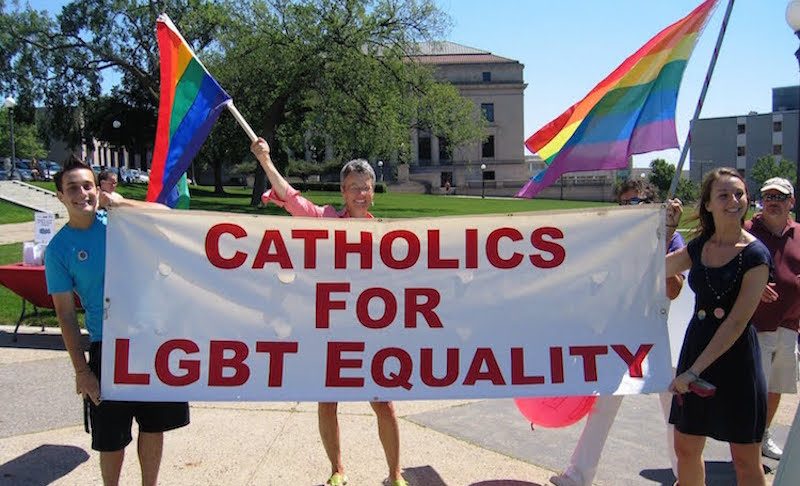I wish more churches would do the same.
With the Catholic Church being the largest Christian denomination in the world, the fight for the dignity and inclusion of its LGBTQI parishioners is a fight for the church’s soul and moral integrity.
DignityUSA since its inception has asserted that God loves the LGBTQI community equally. This year DignityUSA held its 23rd biennial national conference in Boston from July 6-9. Its theme was “A Place at the Table,” challenging the Catholic Church and themselves to practice a ministry of radical inclusion.
John Keeley of Dignity Boston shared that this year’s conference theme was of grave importance to him considering an Illinois bishop’s recent decree denying communion, last rites and funeral rites to people in same-sex marriages – unless, of course, they repent.
“The Catholic Church needs to become truly welcoming. They call themselves welcome but they exclude the (LGBTQI) community from officially receiving any sacraments. They need to make it a full welcome and not a conditional welcome,” Keeley told me.
Since 2015, DignityUSA has been advocating for “sacramental equality” in the Catholic Church. However, one the LGBTQIs most vociferous opponent of it has been Bishop Thomas Paprocki of Springfield, Illinois, as an opposition to the 2015 Supreme Court legalization of same-sex marriage.
Pushback, however, of Paprocki’s decree from Catholic progressives has been swift, hard, and unrelenting. And, one of the strongest and influential voices speaking out against Paprocki’s homophobic vitriol has been that of DignityUSA Executive Director Marianne Duddy-Burke.
“It is simply cruel and shameful to refuse burial or Communion to those who seek the grace and comfort that our Church offers at some of the most difficult moments of life. This is reminiscent of the appalling practice of denying Communion, funerals, and burial to people dying of AIDS at the height of the epidemic. We want to say to Catholics of the Springfield Diocese or others whose parishes or Dioceses do not welcome them as fully who they are, there are Catholic communities that will welcome and affirm you, in the true spirit of our faith.”
DignityUSA conference this year built a huge tent of radical inclusion, challenging itself to hear and to understand the intersections of LGBTQI oppressions the Catholic Church perpetrates on an international stage and to build relationships with LGBTQI Catholics and allies in other countries.
For example, Warry Joanita Ssenfuka, director of Freedom and Roam Uganda (FARUG), spoke on being a Catholic lesbian activist in Uganda, where LGBTQI people have no legal protections, and frequently suffer violence and imprisonment. Ssenfuka is a plaintiff in “Sexual Minorities Uganda v. Scott Lively.” Scott Lively, a white racist homophobic Pentecostal pastor of Springfield, Massachusetts, is accused of persecuting LGBTQI people abroad, resulting in the introduction of an Anti-Homosexuality Bill he helped engineer in Uganda, which is a crime against humanity under international law.
Racism is always an issue predominately white LGBTQI organizations must grapple with. Often it’s easier for these organizations to deal with racism and human abuses on an international level than at home.
Rev. Louis Mitchell, an African American trans man, addressed deep-seated biases that oftentimes impede respectful relationships with diverse groups of people at the conference. “I’m excited by Dignity’s national desire to seek some deeper listening around their issues of diversity and intersectionality, and their recognition that a desire to change and the willingness to sit with the discomfort of change aren’t the same things.” Mitchell is Senior Program Developer for the Transfaith, a multi-tradition, multi-racial, multi-gender organization working to support transgender spiritual/cultural workers and their leadership in community.
Trans issues in our churches are not addressed enough. However, trans activism is taking afoot in Dignity, and their voices want to be heard in Catholic dioceses across the country that will eventually inform and impact the Vatican. Of the many breakout sessions at the conference I wished Pope Francis could have sat in on “Trans Catholic Voices,” because his transphobic pronouncements have been the most hurtful. Francis compares transgender people to nuclear weapons. His reason is that transgender people destroy and desecrate God’s holy and ordained order of creation.
“Let’s think of the nuclear arms, of the possibility to annihilate in a few instants a very high number of human beings,” Francis stated in 2015 in an interview with the National Catholic Reporter “Let’s think also of genetic manipulation, of the manipulation of life, or of the gender theory, that does not recognize the order of creation.”
During the “Trans Catholic Voices” breakout season an African American transwoman pointed out that Francis statements about transpeople deny them of basic human dignity and perpetuates violence against them. As of July 3rd, as a matter-of-fact, Ebony Morgan, 28, an African American transwoman, was the 15th reported trans murder victim of 2017. The life expectancy for black trans is 32 years old.
In her closing remarks the African American transwoman in “Trans Catholic Voices” asked for help from advocates and allies in the room that nearly brought me to tears. “Trans lives are real lives. Trans deaths are real deaths. God works through other people. Maybe you can be those other people.” In understanding that all lives matter in our LGBTQ faith communities DignityUSA conference this year executed a successful display to welcome all “A Place at the Table.”
I wish more churches would do the same.

.jpg)